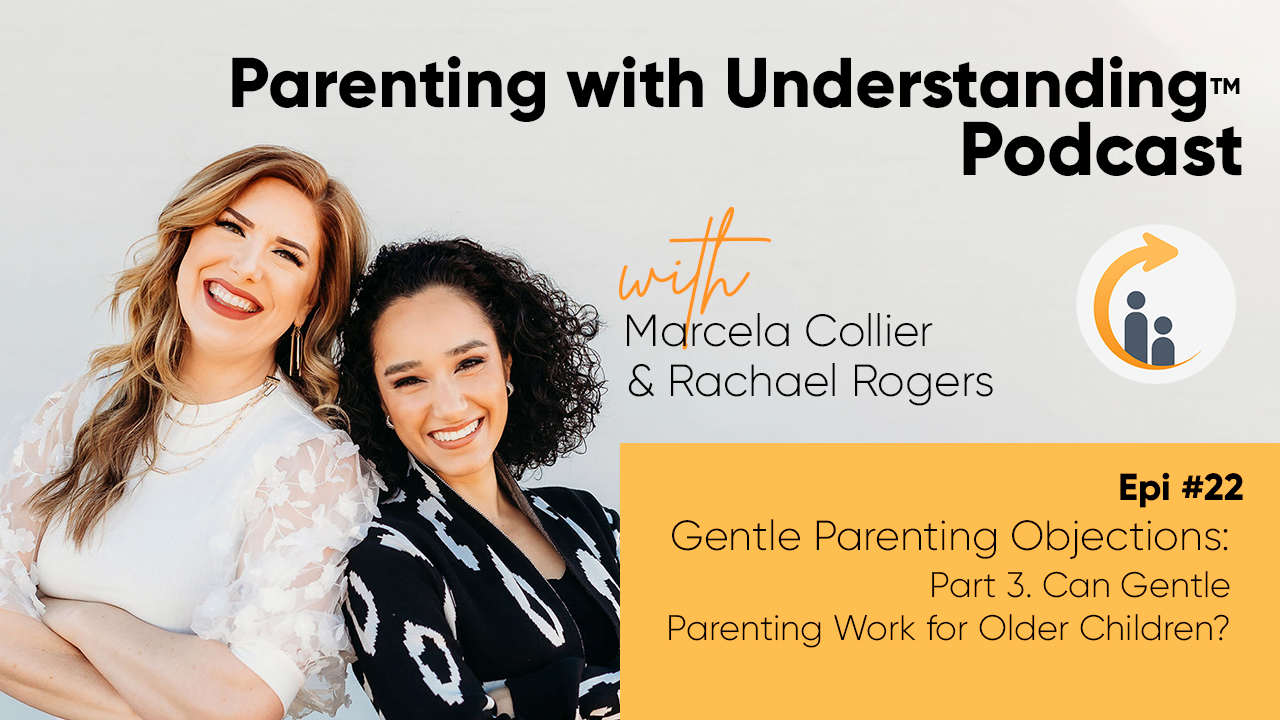Epi #22: Gentle Parenting Objections: Part 3. Can Gentle Parenting Work for Older Children?
Aug 23, 2022
Our August Gentle Parenting Objections series continues today with a focus on older children (tweens and teens) for Part 3. Many parents with kids in this age group often wonder if it’s too late to start gentle parenting with them or if it’s even effective at these ages. Spoiler: it’s never too late and it’ll absolutely still make a positive impact on your parent/child relationship! If you have, or work closely with, tweens and teens, it’s worthwhile for you to tune in!
Do Older Kids Really “Know Better”?
Older kids don’t usually get a pass when it comes to things like following directions because many adults seem to think that since they aren’t babies, toddlers, or “little” kids, they should “know better”...but do they? Consider this, kids are born with a fully developed amygdala, the part of the brain that’s responsible for expressing emotions. However, their prefrontal cortex, the part of the brain that’s responsible for executive functioning isn’t thoroughly developed until age 26! This affects the following:
Time management
Planning ahead
Paying attention
Learning from previous mistakes
Organization
Starting tasks and staying focused long enough to finish them
Regulating emotions
Self-monitoring (being self-aware)
In other words, your tween or teen is incapable of mastering control of these logic and reasoning skills until they’re almost 30! They need your understanding and compassion — not making demands and shame — to see them through this time of learning. Parent modeling is still just as important, effective, and necessary for them as it is for littles.
Don’t Be Fooled by Their Appearance!
Remember, just because they physically resemble adults in that they may be tall and may have facial/body hair, they’re still kids with an underdeveloped brain, so be sure to adjust your expectations to ones that are more realistic!
Even with all my parenting and neuroscience knowledge and experience, I still fell victim to this with my 14-year-old niece, and learned the hard way! She spent the night with us once. The following day, my twins had swimming lessons, so I gave her a heads up that we’d be leaving in 20 minutes. Because she’s almost as tall as my husband, Brian, my brain was tricked into thinking that she could plan and follow through like him, too.
After 20 minutes, we were ready to go, but she was still in the room, talking with friends on the phone, and nowhere near ready. I could feel myself getting frustrated, but I didn’t say anything and we all headed out to swimming practice. Well, we arrived 10 minutes late to a 20 minute swimming class, so they only spent 10 minutes participating in the lesson, so my frustration grew, but I still didn’t say anything.
On the drive home, I thought about the entire situation and that’s when it hit me! I had unrealistic expectations of her simply because of her adult-like physical features, even though parts of her brain were still underdeveloped (and will continue to be for at least another decade)! In the future, I’d brainstorm ways with her on what would be helpful for her to be ready on time. This way, I’m demonstrating my curiosity and support, while she’s being active in finding ways to support herself, also.
Shift Your Mindset Concerning Tweens and Teens
This story is just one example explaining why it’s so important for us to take a step back to assess the situation with our particular kids and apply understanding, instead.
Behavior isn’t indicative of a child’s morality. It doesn’t define whether they’re “bad” or “good”.
Also, punishments won’t provide your tween or teen with better skills. All it does is create a deeper divide in your relationship.
Change the narrative in your head about the way you perceive their behavior as “disrespectful”, “lazy”, “spiteful”, etc., when it’s all really developmental, NOT personal.
So, what should you do? Approach them after you’ve worked to regulate your nervous system. Focus on breathwork. Wait until after you’ve reflected and have processed your emotions. Also, make sure to give them time to do the same for themselves. Then, approach them about the situation. Many parents of tweens and teens have found HIC Parenting’s The Considerate Conversation Formula E-book very helpful and impactful in facilitating these types of conversations. The ultimate goal is to make sure that our kids always know we see, value, and respect them.*
In other great news, our tween/teen Parenting Coach and Pediatric Psychologist, Dr. Ann-Louise Lockhart is live-hosting a FREE masterclass on Zoom, End the Struggle with Your Tween or Teen on Friday, August 26th, 2022, at 7pm EST / 4pm Pacific. Be sure to register, by clicking the link below, so that you get the roadmap to saving the relationship with your adolescent.
Master Class: End the Struggle with Your Tween or Teen
Also, if you’d like to get a copy of HIC’s The Considerate Conversation Formula E-book, which provides a proven communication flow to help you peacefully guide your children from “chaos” to “calm” in 5 simple steps, you can do so by clicking on the link below:
The Considerate Conversation Formula E-book



